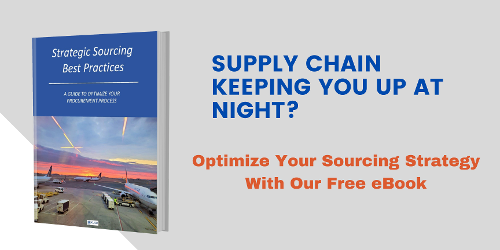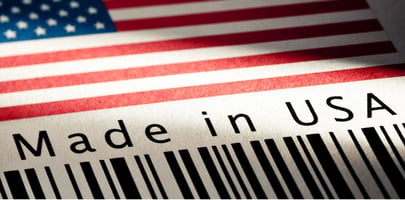In the wake of President Trump’s tariffs on some Chinese products and calls from environmentalists...
Everything You Need To Know About Incoterms 2020
These are turbulent times. Now in its second year, the COVID-19 pandemic and consequent shutdowns created countless challenges for companies to do business. Supply chains in particular have been disturbed and it's unclear when things will go back to normal, if ever.
In all this tumult it’s quite understandable if you missed the release of the 2020 Incoterms. In the following article, we’ll review those most recent changes, the status of the 2010 Incoterms and what it means for your business.
What are Incoterms?
Created by the ICC in the early 1900s, Incoterms (International Commercial Terms) are a list of terms used for international trade, though the UNECE would argue it’s more of a set of informal rules. As the Government of New Zealand commented, it’s meant to clearly describe any and all risks, costs, and responsibilities of sellers and buyers in the export transaction.
The keys are consistency and transparency. , As long as all parties involved know which set of terms (e.g. Incoterms 2010) are being used, there shouldn’t be any issues.
What are the Incoterms Terms?
Essentially, Incoterms help make sure everyone involved knows what they are supposed to do. For example, regarding the term Ex Works (EXW), according to DHL, an item is delivered to the buyer when the goods arrive at the agreed location. There are currently eleven different Incoterms.
The number of Incoterms has fluctuated over time, from six to nine to the current eleven. Seven of the terms apply to all while the remaining four are specific to seaborne trade, according to DHL. To more easily explain and visualize the different terms, the terms are organized below in a table.
|
Acronym |
Incoterm |
Category |
Definition |
|
EXW |
Ex Works |
General |
Seller has delivered goods to the buyer when the goods arrive at the agreed location |
|
FCA |
Free Carrier |
General |
Seller has delivered goods once the goods are loaded onto transport (if to be sent to buyer) or once unloaded (if to be sent elsewhere) |
|
CPT |
Carriage Paid To |
General |
Seller delivers goods through a mutually designated carrier, transferring responsibility of delivery to carrier and buyer |
|
CIP |
Carriage and Insurance Paid To |
General |
Same concept as CPT but with the additional cost of insurance factored in |
|
DAP |
Delivered at Place |
General |
Seller is responsible for goods’ safety and their arrival at the agreed upon destination, responsibility of goods transferred upon arrival |
|
DPU |
Delivered at Place Unloaded |
General |
Same concept as DAP but with seller responsible for unloading of goods at location |
|
DDP |
Delivered Duty Paid |
General |
Seller has delivered goods when goods have been loaded on transport with import and customs sorted (by buyer not seller) |
|
CIF |
Cost, Insurance and Freight |
Sea and Waterway Transport |
Same concept as CIP but for goods transported via sea |
|
CFR |
Cost and Freight |
Sea and Waterway Transport |
Seller has delivered goods once goods are placed on chosen ship |
|
FAS |
Free Alongside Ship |
Sea and Waterway Transport |
Seller has delivered goods once goods are placed alongside the ship at chosen port |
|
FOB |
Free on Board |
Sea and Waterway Transport |
Seller has delivered goods once goods are placed on chosen ship at chosen port |
Can I Still Use Incoterms 2010?
In a word: yes, Incoterms 2010 are still relevant and utilized. Older iterations of Incoterms are not, however, meant to be used with more recent iterations.
A contract should really not include both terms from Incoterms 2010 and Incoterms 2020. Doing so would basically render the whole concept of Incoterms moot and just confusing relevant parties.
But what is the difference between Incoterms 2010 and 2020? Why can the terms not be used together and mixed into a contract for example? The following table will break down what makes both Incoterms iterations unique according to ICC Academy and the ICC itself.
|
Acronym |
Incoterm |
Changes |
|
FCA |
Free Carrier |
Slightly changed to include an “onboard bill of loading” provision to help people shift away from FOB due to FOB’s greater limitations |
|
CIP |
Carriage and Insurance Paid To |
New term in Incoterms 2020; increased importance to the “Insurance” aspect to better differentiate from CIF (CIP is used more for manufactured goods) |
|
DPU |
Delivered at Place Unloaded |
Changed from DAT (Delivered at Terminal) as DAT implies sellers can only unload at terminal as opposed to any specified or agreed upon location |
|
CPT |
Carriage Paid To |
Slightly changed to better encompass the newer international trade security requirements |
What It Means For You
Evidently, changes between Incoterms 2010 and Incoterms 2020 are limited. No new terms were added nor were any terms removed as had been done decades prior. Moreover, when dealing with any potential partners, so long as you and your partner agree, Incoterms 2010 is still applicable.
All deals, contracts, and agreements drafted using Incoterms 2010 and/or prior to the publication of Incoterms 2020 are still valid and will not magically become invalid on account of Incoterms 2020.
Incoterms as a whole were always meant to foster common ground and greater understanding among businesses, not to make life harder for them but instead inform relevant parties of different stages and costs such as insurance they are responsible for in international trade from handling of goods, to shipping, to transport, and finally to delivery.
-1.jpg?width=146&height=50&name=Kusu%20(1)-1.jpg)




